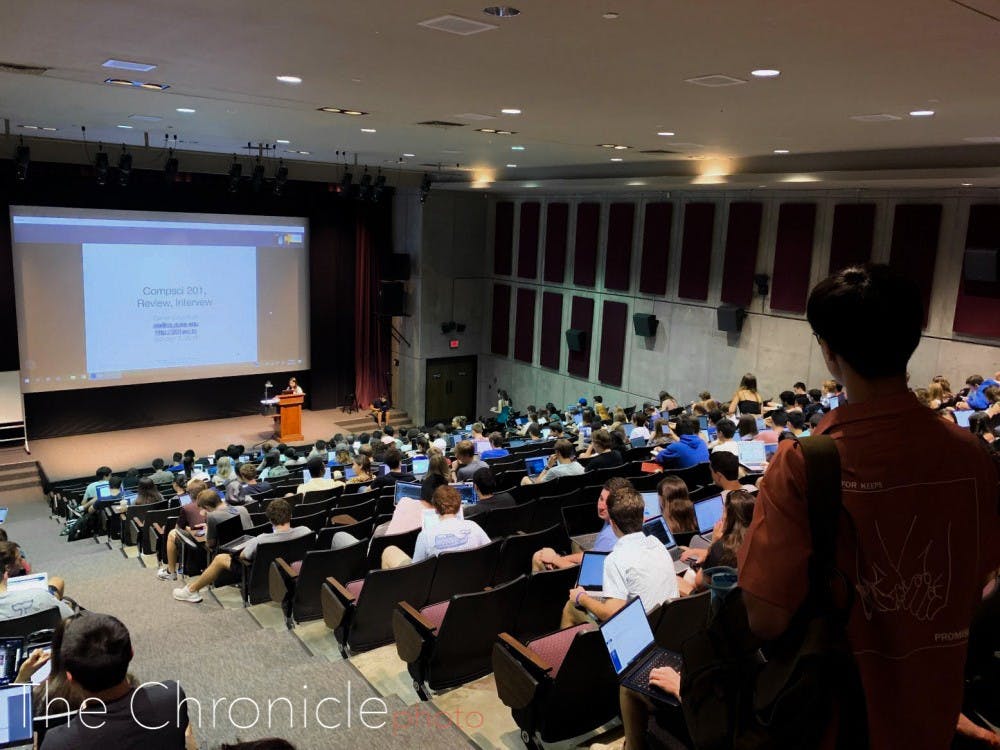Ever wonder who’s responsible for making students drag themselves out of bed and stumble into that old lecture hall at 8:30 in the morning? Don’t immediately blame the professor.
Turns out, there is a course schedule policy that all academic departments must follow at Duke. Set forth by the Office of the University Registrar, the course schedule policy governs both undergraduate and graduate class schedules, and specifies time periods and allowable meeting times for proposed classes on a departmental basis.
Despite these strict guidelines, teachers do get to indicate their time preferences.
According to Natalia Silva Harwood, assistant to the director of undergraduate studies in the psychology and neuroscience department, the Registrar Office’s online policies are matched with what faculty members indicate in their questionnaires about their availabilities and class time preferences.
“I ask that they give me a minimum of three options so we have enough options to make sure the schedule passes the Registrar’s scheduling system validation and to avoid conflicting with other core classes,” Harwood wrote in an email.
She noted, however, that even though she tries to accommodate them, professors aren’t always guaranteed their first choice. According to Harwood, the office will “never assign teaching times without making sure they work with the professors first.”
Amy Jones is a graduate student teaching German 101 this semester who filled out the questionnaire. Her class is taught every morning Monday through Thursday from 8:30 to 9:45 a.m.
“What I like about teaching early classes is that the students are always very motivated,” Jones wrote in an email. “It's also usually a smaller group, and that means each student can get a lot of individual attention.”
But Jones added that teaching later in the day can make it more difficult to get to work early. She wanted to teach in the morning because she believed it would be helpful in more efficiently writing her dissertation.
However, other scheduling matters are not as simple.
Gregory Wray, professor of biology and director of Duke’s Center for Genomic and Computational Biology, teaches Gateway to Biology: Molecular Biology, Genetics & Evolution, a currently meets on Monday, Wednesday and Friday from 8:30 to 9:45 a.m.
Wray found that scheduling is a “remarkably complicated process” due to extensive external constraints.
He first noted that a classroom with the proper elements一“right capacity, AV equipment, and configuration,” as he listed一must be available. The class is taught by three faculty members and two to three TAs, so Wray explained that their schedules needed to be accommodated as well.
Biology 203L is an introductory course for biology majors, so it cannot conflict with other typical first-year classes for biology majors, namely introductory chemistry and calculus, Wray wrote in an email to The Chronicle. This requires coordination with these other departments when scheduling classes.
Most importantly, since Biology 203L is a science course, there is a lab component in the afternoon, requiring lectures to be held in the morning.
Like Jones, Wray is allowed to indicate preferences for his lecture time slots. However, he doesn’t believe this is entirely helpful.
“Meeting the professor's preferences is much more difficult for a class like Bio 203 than it would be for, say, a FOCUS or seminar class where there is one instructor, many available rooms, and fewer external constraints,” he wrote.
Although the earliest courses at Duke begin at 8:30 a.m., some don’t wrap up until about 12 hours later. Durham artist Thomas Whiteside teaches The Silent Film: An Introduction, a seminar held on Monday nights from 6:15 to 8:45 p.m.
Whiteside said that he likes to have one long class per week as opposed to several shorter meetings, as the course involves film screenings.
He is teaching the course for the first time this semester. Last semester, the class was offered from 8:45 to 11:15 a.m., but only four students signed up and it was canceled.
Whiteside added that his students seem to have no problem with an evening course. He plans to keep the class at this time moving forward.
“Although it might be unusual, I have not heard any complaints from students about the time,” he wrote in an email. “I will add that no one has missed a class, nor even been late, so I'd say it's working well.”
He added that he would have been fine with teaching the 8:45 a.m. section, but he understands that “students don’t like early morning classes.”
Rules to live by
The course schedule policy dictate a set of time periods for 50-minute lectures versus 75-minute and 150-minute classes. All classes must start at the indicated start times in the table and cannot end within the gaps between different time periods.
The policies also dictate meeting patterns depending on the length and frequency of the class. For example, 50 minute classes that meet three-times per week must meet on Monday, Wednesday, and Friday, and classes taught one day per week can be taught on any day.
In the distribution of time slots, the registrar regulates that departments can only schedule up to 50% of all their classes below the 700 level between 10:05 a.m. and 2:40 p.m., a range known as “prime time.”
There are special circumstances to this policy, such as departments that offer six or fewer courses per semester. However, candidates for these exceptions are still required to “provide a reasonable spread of courses over the day and week” according to the Course Schedule Policy website.
Distribution policies also require that at least 40% of classes must meet on three or more days per week, or two days per week in Monday-Wednesday, Monday-Friday or Wednesday-Friday patterns.
Get The Chronicle straight to your inbox
Signup for our weekly newsletter. Cancel at any time.

Leah Boyd is a Pratt senior and a social chair of The Chronicle's 118th volume. She was previously editor-in-chief for Volume 117.

